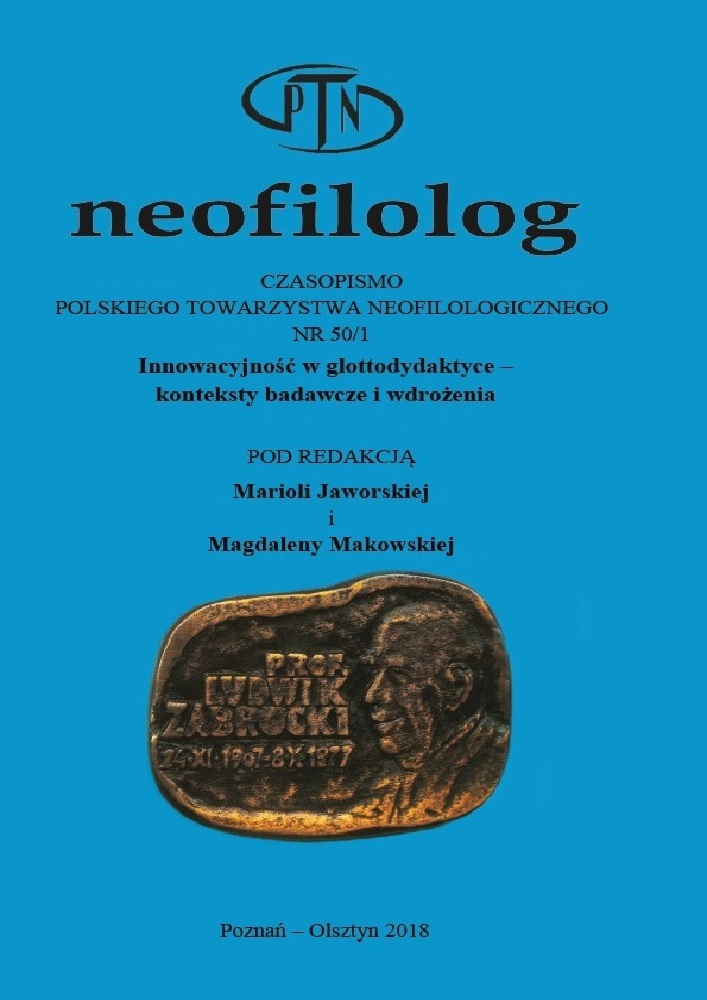Abstract
The aim of this article is to present what the intuition is that occurs during communicative practice and gives us the immediate answer to different doubts and the immediate understanding of language structures without conscious reasoning and loading of the cognitive system. In the first part, we analyze different concepts of language intuition presented in lingusitic and foreign language acquisition. In the second part, a comparative analysis of automatic, controlled and intuitive processes is provided. We show that the distinction between operations that are automatic and those that are under control is a simplification and reduces the issue of foreign language acquisition. In the same part, we also argue for the use of intuition and suggest some indications favorable to implementation of this mental disposition.References
Bajrić S. (2005), Question d’intuition (w) „Langue française. La langue française au prisme de la psychomécanique du langage. Héritages, hypothèse et controverses”, nr 147, s. 7-18. Online: http://www.persee.fr/doc/lfr_0023-8368_2005_num_147_1_6860 [DW 30.10.2017].
Blachowska-Szmigiel M. (2008), Schematy umysłowe a rozwijanie twórczych wypowiedzi opisowo-narracyjnych na zajęciach z języka obcego (w) Jodłowiec M. (red.), Nowe perspektywy nauczania języków obcych. Seria „Język a komunikacja” 20. Kraków: Tertium, s. 17-24.
Cuq J.-P. (red.) (2003), Dictionnaire de didactique du français langue étrangère et seconde. Paris: Cle International.
Dakowska M. (2001), Psycholingwistyczne podstawy dydaktyki języków obcych. Warszawa: Wydawnictwo Naukowe PWN.
Europejski system opisu kształcenia językowego: nauczanie, uczenie się, ocenianie (2003). Warszawa: Wydawnictwa CODN.
Degalowitz N.S., Favreau M. (1983), Automatic and controlled processes in the firsthand second-language reading affluent bilinguals (w) „Memory & Cognition”, nr 11(6), s. 565-574.
Kahneman D. (2011),Pułapki myślenia. O myśleniu szybkim i wolnym, tłum. P. Szymczak, Poznań: Media Rodzina.
Lewandowska-Tomaszczyk B. (2010), Introspekcja i intuicja w uczeniu się kategorii językowych (w) Nijakowska J. (red.), Interdyscyplinarne studia nad świadomością i przetwarzaniem językowym. Kraków: Tertium, s. 41-74.
Levelt W.J.M. (1978), Skill theory and language teaching (w) „Studies in Second Language Acquisition”, nr 1, s. 53-68.
Łukaszewski W. (2017), Umysł (w) „Charaktery”, nr 6, s. 3.
Maruszewski T. (2001), Psychologia poznania. Sposoby poznania i rozumienia siebie i świata. Gdańsk: Gdańskie Wydawnictwo Psychologiczne.
McLeod B., Laughlin B. (1986), Restructuring or automaticity? (w) „Language Learning”, nr 36, s. 109-123.
Motycka A. (2005), Rozum i intuicja w nauce. Zbiór rozpraw i szkiców filozoficznych. Warszawa: Eneteia.
Nęcka E. (2001), Psychologia twórczości. Gdańsk: Gdańskie Wydawnictwo Psychologiczne.
Niżegorodcew A. (2007), Uwaga w procesie nauki języka obcego (w) Majer J., Nijakowska J. (red.), Język – poznanie – zachowanie. Studia nad psycholingwistycznymi aspektami przyswajania języka. Łódź: Wydawnictwo Naukowe Uniwersytetu Łódzkiego, s. 52-67.
Nosal Cz. (2007), Psychologia poznania naukowego-umysły i problemy (w) „Nauka”, nr 2, s. 57-76.
Nosal Cz. (2008), Inteligencja i intuicja. Komplementarność w strukturze zdolności umysłowych (w) Brzeziński J., Cierpiałkowska L. (red.), Zdrowie i choroba: problemy teorii, diagnozy i praktyki. Sopot, Gdańsk: Gdańskie Wydawnictwo Psychologiczne, s. 439-455.
Polański K. (red.) (2003), Encyklopedia językoznawstwa ogólnego. Wrocław: Ossolineum.
Shiffrin R.M., Schneider W. (1977), Controlled and automatic human information processing: II Perceptaual learning, automatic attending, and a general theory (w) „Psychology Review”, nr 84, s. 127-190.
Sharwood-Smidt M. (1991), Speaking to Many Minds: On the Relevance of Different Types of Language Information for the L2 Learner (w) „Second Language Research”, nr 7, s. 118-132.
Stróżewski W. (1994), Istnienie i sens. Kraków: Znak.
Wilczyńska W. (2014), Myślenie automatyczne a myślenie refleksyjne, czyli o podejmowaniu
decyzji językowych w J2 (w) Baran- Łucarz M. (red.), Refleksja w uczeniu się języków obcych. Wrocław: Wydawnictwo Uniwersytetu Wrocławskiego, s. 173-190.
License
Copyright (c) 2018 Wioletta Piegzik

This work is licensed under a Creative Commons Attribution-NoDerivatives 4.0 International License.
Authors
Authors of texts accepted for publication in Neofilolog are required to complete, sign and return to the Editorial team’s office the Agreement for granting a royalty-free license to works with a commitment to grant a CC sub-license.
Under the agreement, the authors of the texts published in Neofilolog grant Adam Mickiewicz University in Poznań a non-exclusive, royalty-free license and authorize the use of Attribution-NoDerivatives 4.0 International (CC BY-ND 4.0) Creative Commons sub-license.
The authors retain the right to the free disposal of the work.
Users
Interested Internet users are entitled to use works that have been published in Neofilolog since 2017, under the following conditions:
▪ attribution – obligation to provide, together with the distributed work, information about the authorship, title, source (link to the original work, DOI) and the license itself.
▪ no derivatives – the work must be preserved in its original form. Without the author's consent, it is not possible to distribute the modified work in the form of translations, publications, etc.
Copyrights are reserved for all texts published since 2017.
Miscellaneous
Adam Mickiewicz University in Poznań retains the property right as a whole (layout, graphic form, title, cover design, logo etc.).
